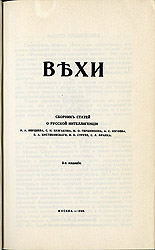As you already know, as Russia entered the twentieth century, there were fundamental socio-economic changes taking place within the empire. Some Russian statesmen such as Count Sergei Witte, minister of finance and later Prime Minister, Prince Dmitrii Sviatopolk-Mirskii, minister of the interior, Aleksandr Bulygin, minister of the interior, and Petr Stolypin, prime minister, all made proposals to accomplish some substantial political and economic reform to modernize the empire.
 |
Russian intellectuals also became alarmed over Russia's prospects for the future. In 1909 Mikhail Gershenzon (1869-1925) published a collection of seven articles by some of the leading intellectuals of the day. Vekhi: A Collection of Articles about th Russian Intelligentsia included contributions by Nikolai Berdiaev, Sergei Bulgakov, Aleksandr Izgoev, Bogdan Kistiakovskii, Petr Struve, Semen Frank and Gershenzon himself. The collection was a scorching assessment of the role of the intelligentsia in Russian society, and, as a result, it generated a firestorm of comments. The contributors all tended to say that the intelligentsia had failed in its task to lead Russia, especially in light of the failures of the 1905 Revolution. The time had now come to rethink the purpose of the intelligentsia and the future of Russia. |
Lenin also
formulated his vision of a future, Marxist Russia. In the
fall of 1901 Lenin set to work writing down his blueprint, which ended
up being published as What Is To Be
Done? (1902) The title was an exact copy of Nikolai
Chernyshevskii's (1828-1889) novel of the same name, What Is To Be
Done? (1864)
which had inspired the Russian populists of the 1860s.
Lenin foresaw a tightly-organized, Marxist, vanguard of professional revolutionaries who would be able to lead the Russian workers (and maybe the peasants too) to overthrow the tsar and then begin to implement a future Marxist state.